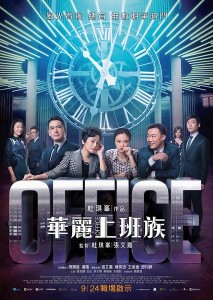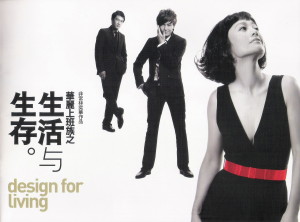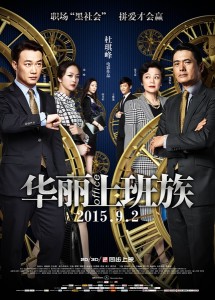Office
华丽上班族
China/Hong Kong, 2015, colour, 2.35:1, 3-D, 118 mins.
Director: Du Qifeng 杜琪峰 [Johnnie To].
Rating: 6/10.
Eye-catching but otherwise uninvolving musical centred on ambition and big business.
Hong Kong, 2008. Two new recruits to the sales department of giant trading company Jones & Sunn International arrive for their first day of work: eager beaver Li Xiang (Wang Ziyi), as a sales assistant, and quieter He Qi (Lang Yueting), as a general assistant. He Qi is actually the daughter of the chairman, He Zhongping (Zhou Runfa), whose wife (Gong Ci’en) is in hospital in a coma; it was her money that helped found the company. For the past 20 years He Zhongping’s mistress has been Zhang Wei (Zhang Aijia), the company’s all-powerful CEO, who began her career as his secretary. She is the only person (apart from He Zhongping) to know He Qi’s real identity. Jones & Sunn is planning to go public  with an IPO and is being audited by accountant Grey & Young. However, deputy CEO Wang Dawei (Chen Yixun) has yet to deliver the accounts for 2007 as he has been using the company’s resources to speculate on some questionable stocks in an already unstable share market. He Zhongping tells Wang Dawei to dump the stocks prior to the IPO, but instead Wang Dawei holds on to them privately, still hoping to make a killing. As well as continuing his loose affaire with Zhang Wei, Wang Dawei also starts to romance the company’s workaholic financial controller, Su Fei (Tang Wei), a Mainlander from Hangzhou who’s currently being ditched by her fiance Dong. While Wang Dawei is entertaining a potential new western client, cosmetics firm Madame, that is keen to enter the Mainland market, He Zhongping secretly tells Zhang Wei he’s heard that US investment bank Lehman Brothers is bankrupt, the news of which could impact the world economy. But he says the IPO should go ahead as Jones & Sunn’s accounts are clean. That evening, Li Xiang spots He Qi being chauffeured home and suspects she may not be the ordinary young woman she claims. Meanwhile, Su Fei fends off Wang Dawei’s advances when he turns up drunk at her flat. As the share market starts to plummet, Wang Dawei finds himself dangerously exposed with the stock he holds. And Zhang Wei, suspecting that Madame is not so financially stable, proposes a deal that she keeps secret from He Zhongping.
with an IPO and is being audited by accountant Grey & Young. However, deputy CEO Wang Dawei (Chen Yixun) has yet to deliver the accounts for 2007 as he has been using the company’s resources to speculate on some questionable stocks in an already unstable share market. He Zhongping tells Wang Dawei to dump the stocks prior to the IPO, but instead Wang Dawei holds on to them privately, still hoping to make a killing. As well as continuing his loose affaire with Zhang Wei, Wang Dawei also starts to romance the company’s workaholic financial controller, Su Fei (Tang Wei), a Mainlander from Hangzhou who’s currently being ditched by her fiance Dong. While Wang Dawei is entertaining a potential new western client, cosmetics firm Madame, that is keen to enter the Mainland market, He Zhongping secretly tells Zhang Wei he’s heard that US investment bank Lehman Brothers is bankrupt, the news of which could impact the world economy. But he says the IPO should go ahead as Jones & Sunn’s accounts are clean. That evening, Li Xiang spots He Qi being chauffeured home and suspects she may not be the ordinary young woman she claims. Meanwhile, Su Fei fends off Wang Dawei’s advances when he turns up drunk at her flat. As the share market starts to plummet, Wang Dawei finds himself dangerously exposed with the stock he holds. And Zhang Wei, suspecting that Madame is not so financially stable, proposes a deal that she keeps secret from He Zhongping.
REVIEW
It’s not what you’re meant to do after a musical, but you really do come out of Office 华丽上班族 whistling the sets. With the eye-catching production design by Hong Kong ace Zhang Shuping 张叔平 [William Chang] outclassing (and overwhelming) both the script and most of the performances, this musical adaptation of the 2008 play by Taiwan actress-filmmaker Zhang Aijia 张艾嘉 [Sylvia Chang] ends up as a curiously uninvolving and so-what production under the technically smooth but otherwise unfocused direction by Hong Kong veteran Du Qifeng [Johnnie To]. Meant to be a cutting allegory on workplace ambition and greed, Zhang’s own adaptation has only slim parallels in plot and characters with her original play. But even on those terms Office is a disappointment: Du already tackled the theme of greed far more affectingly in his recent Life without Principle 夺命金 (2011), and as a musical about workplace politics and ambition Office doesn’t hold a candle to the Frank Loesser Broadway classic How to Succeed in Business without Really Trying (1961; filmed in 1967), whose plot and look it recalls in the opening scenes.
The original play, Design for Living 华丽上班族之生活与生存 (literally, “Splendid Office Workers: Life and Survival”), was the idea of Hong Kong theatre director Lin Yihua [Edward Lam], who’d been trying to lure Zhang back to the stage for several years. After coming up  with the idea and characters, he got Taiwan writer Wang Jiyao 王纪尧 (author of the original novel behind teenage gay melodrama Eternal Summer 盛夏光年, 2006) to write four drafts of a play which Zhang then reworked into a final version, reportedly using only 10-20% of Wang’s material. Starring Zhang herself, as a ruthless but ultimately lonely CEO who manipulates her staff and lovers amid a maelstrom of office politics, the play, co-starring Taiwan popster-TV actor Zheng Yuanchang 郑元畅 and actor-comedian Wang Yaoqing 王耀庆, opened in Shenzhen, China, on 27 Nov 2008, followed by other dates in China and Singapore.
with the idea and characters, he got Taiwan writer Wang Jiyao 王纪尧 (author of the original novel behind teenage gay melodrama Eternal Summer 盛夏光年, 2006) to write four drafts of a play which Zhang then reworked into a final version, reportedly using only 10-20% of Wang’s material. Starring Zhang herself, as a ruthless but ultimately lonely CEO who manipulates her staff and lovers amid a maelstrom of office politics, the play, co-starring Taiwan popster-TV actor Zheng Yuanchang 郑元畅 and actor-comedian Wang Yaoqing 王耀庆, opened in Shenzhen, China, on 27 Nov 2008, followed by other dates in China and Singapore.
Running almost four hours, and played on a spartan stage with movable furniture and a broad staircase at the back, the production was tweaked and tightened during subsequent tours in China and Hong Kong during 2009 and 2010. Zhang had actually imagined a musical version early on, and a film, to be directed by Du, with songs by Li Zongsheng 李宗盛 [Jonathan Lee] and Chen Jianqi 陈建骐, and starring Zhang, Mo Wenwei 莫文蔚 [Karen Mok}, Zhou Runfa 周润发 [Chow Yun-fat] and original cast member Zheng, was originally scheduled to start production in 2011.
Where the play had no specific location and was always presented in Mandarin (even in its Hong Kong performances), Office specifically locates itself in a kind of abstract Hong Kong, with dialogue yoyo-ing between Cantonese, Mandarin and bits of English, while the songs, distractingly, are all in Mandarin. The cast, drawn from across Greater China, blends better. Playing the chairman and CEO (and longtime lovers), Zhou and Zhang – who last co-starred in Du’s All about Ah-Long 阿郎的故事 (1989) and Coming to America remake The Fun, The Luck & The Tycoon 吉星拱照 (1990) – anchor the film with the only characters who really resonate and have any emotional depth; Hong Kong’s Chen Yixun 陈奕迅 [Eason Chan] is OK as the oily deputy CEO; and even Mainlander Tang Wei 汤唯 , though stuck in a severly underwritten role as the company’s workaholic accountant, actually manages this time to stay in character throughout.
The problem is the script’s focus. As well as reducing her own role to just one of an ensemble, instead of being the pivotal character, Zhang never makes clear who the audience should be rooting for: with its How to Succeed in Business-like opening, the screenplay initially proposes two new recruits (one of whom is the chairman’s incognito daughter) but, though acceptably played by Mainlanders Wang Ziyi 王紫逸 and Lang Yueting 朗月婷 – both also in Du’s Blind Detective 盲探 (2013) – their stories are never woven through the narrative or developed in a way that the viewer can identify with. In practice, and especially during the second half, Office is dominated by Chen’s lothario exec who’s up to his ears in a dodgy share deal that could torpedo the company’s planned IPO; when the market crashes an hour into the film, his paranoia takes over much of the action.
Much more matronly and reserved than her character in the original play, Zhang often looks stiff in a beehive hairdo and doesn’t come through as the proactive character she should, though she and Zhou do share some affectingly mellow moments that give the movie its sole emotional depth. The new-look, slimmed-down Zhou looks more commanding and less frail than in From Vegas to Macau II 赌城风云II (2015). Other roles are essentially background.
Some of the screenplay’s weaknesses could have been rectifed by a memorable score and lyrics, whose job in a musical is to take over where dialogue can no longer go. Alas, despite their creators’ reputations, the 22 songs by Taiwan composer Luo Dayou 罗大佑 and Hong Kong lyricist Lin Xi 林夕 [Albert Leung] simply mark time in a tuneless, pedestrian way, adding little to what the viewer already knows, and some (like a bedroom soliloquy by Zhang) are so brief as to be pointless. Though the ensemble cast almost breaks into dance at some points, Office, frustratingly, has no real choreographed numbers, despite sets that seem built for them. Though Office is Du’s first musical proper, he’s always shown a gift for fluid staging – Sparrow 文雀 (2008) was almost a musical without songs – which makes the lack of dance numbers even more disappointing.
Taking clues from the original play’s staging, designer Zhang Shuping goes for a deliberately theatrical look, with sliding sets and transparent walls, but dominated visually by horizontal and vertical slatting (stairways, strip lighting), an overall grey/white colour scheme, and (more obviously) clocks everywhere, including a giant rotating one in the centre of the main office set. The result is a kind of cross between Metropolis and How to Succeed in Business – not an especially original way to underline the themes of money-making and ambition but strikingly engineered on a sizeable art budget. The widescreen camerawork by versatile Du regular Zheng Zhaoqiang 郑兆强 [Cheng Siu-keung] takes full advantage of the possibilities thrown up by Zhang.
The ironic Chinese title means “Splendid [or Gorgeous] Office Workers”.
CREDITS
Presented by Beijing Hairun Pictures (CN), Edko Films (HK). Produced by Beijing Hairun Pictures (CN).
Script: Zhang Aijia [Sylvia Chang]. Play: Zhang Aijia [Sylvia Chang], Wang Jiyao. Photography: Zheng Zhaoqiang [Cheng Siu-keung]. Editing: David Richardson, Liang Zhanlun. Music direction: Luo Dayou. Music: Chen Huiyang. Song music: Luo Dayou. Lyrics: Lin Xi [Albert Leung]. Production design: Zhang Shuping [William Chang], Qiu Weiming [Yau Wai-ming]. Costume design: Zhang Shuping [William Chang], Lv Fengshan. Sound: Du Duzhi, Wu Shuyao. Action: Yi Tianxiong. Visual effects: Luo Weihao (Different Digital Design). Choreography: Wu Yulie.
Cast: Zhang Aijia [Sylvia Chang] (Zhang Wei/Winnie, CEO), Zhou Runfa [Chow Yun-fat] (He Zhongping, chairman), Chen Yixun [Eason Chan] (Wang Dawei/David, deputy CEO), Tang Wei (Su Fei/Sophie), Wang Ziyi (Li Xiang), Lang Yueting (He Qi/Kat), Zhang Zhaohui [Eddie Cheung] (Sun Qiang/John), Tian Xin (Tang Jialing), Che Wanwan (Cheng Ban/Ben), Hong Tianming (Ye Hao/Howard), Zhu Jianjun (Shen Kai/Kevin), Huang Zhiqing (Tong Dongmei), Zhou Jiayi (head of PR department), Gong Ci’en [Mimi Kung] (He Zhongping’s wife), Lu Haipeng (foyer security guard), Jiang Haowen [Philip Keung] (stockbroker), Fan Yimin (Ye, lawyer), David Mersault (Richard Greenberg).
Release: China, 2 Sep 2015; Hong Kong, 24 Sep 2015.
